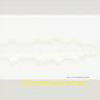William Basinski, "Shortwave Music"
 Using shortwave radios to pull sounds out of the ether has been a longstanding tradition in experimental music. Karlheinz Stockhausen and John Cage were perhaps the first to explore this area, fascinated by the possibilities inherent in using the radio as an instrument. It is often left to a second generation of explorers to further develop the discoveries made by the first trail blazers. In 1982 William Basinski carved out his own territory in the worlds of shortwave sound with nothing more than a receiver and his trademark loops of tape. First released on Noton as an LP in 1997, it has been made available once again, this time on compact disc from Basinski’s own label.
Using shortwave radios to pull sounds out of the ether has been a longstanding tradition in experimental music. Karlheinz Stockhausen and John Cage were perhaps the first to explore this area, fascinated by the possibilities inherent in using the radio as an instrument. It is often left to a second generation of explorers to further develop the discoveries made by the first trail blazers. In 1982 William Basinski carved out his own territory in the worlds of shortwave sound with nothing more than a receiver and his trademark loops of tape. First released on Noton as an LP in 1997, it has been made available once again, this time on compact disc from Basinski’s own label.
Shortwave radios are easy to find and relatively affordable. They emit whole slews of interesting sounds, all with an element of indeterminacy: it is hard to know what will be picked up by the antenna, giving the process of using one musically a nebulous mysticism. Scanning the dial turns up bits of Morse code, the rapid pulse of telemetry, fragments of newspeak rendered in foreign languages, muzak broadcast from halfway across the world. No wonder it has had and continues to have so much appeal for musicians.
The songs Basinksi has crafted on this album make for some of his most brilliant and memorable excursions. Listening, I picture him as an explorer of invisible worlds. From the comfort of his terrestrial abode he scries the airwaves amidst endless spools of tape as shrill alien sounds emanate from the radio. The disc is bathed in a resplendent otherworldly glow, emerging from the warm static of buzzing transistors and delicate white noise. The five pieces are very somber, very soothing and calming to the enervated mind. The disc is sequenced in a way that shows a gradual refinement, as if at a certain moment, the élan vital behind what he was trying to capture made itself manifest through the ether and the reel to reel, happily recording, was able to capture it.
“Evening Scars” opens the album with a lush orchestral phrase. Joined by the warbling oscillation of the radio receiver caught fluttering between stations; the two sounds intertwine around each other in a fine tuned balance. This is the perfect noise for washing the body with after a tiring day of work. The slight fades between songs are nearly imperceptible, even though clearly demarcated. Like the steps of a spiral staircase, each song elevates the mind to a new level of musical ecstasis. Thus “Cobalt Pools” flows seamlessly into “Fringe Area,” a dark and icy piece that captures the vicissitudes often accompanying contact with praeterhuman intelligence. Which is what I feel Basinski is doing in these songs: reaching beyond the void of space and time, listening for signs of nonhuman life, and making contact. Whenever this album is played, it is as if some subtle, metaphysical information is being imparted. As such, “On a Frontier of Wires” is the most profound revelation contained. Veiled female voices whisper in lulling sibilants from behind the magnetic cacophony. And like his Disintegration Loops, the voice gradually fades, decomposes, and falls apart. A recurrent series of notes, like a detuned angelic horn, rings its siren call throughout the near 24 minutes of the song. As with all great exercises in minimalist repetition, it never loses its welcome, and becomes familiar as a well loved mantra. “Particle Showers,” which was not released on the original LP version, makes for a nice come down from the bliss that was felt on the previous tracks.
These experiments formed the basis for the working methods Basinksi would later exploit on his 90 minute shortwave magnum opus, The River, and showcase the musical studies that would make it possible. Nothing short of masterworks themselves, these studies are testament to a bright musical mind.
samples:



